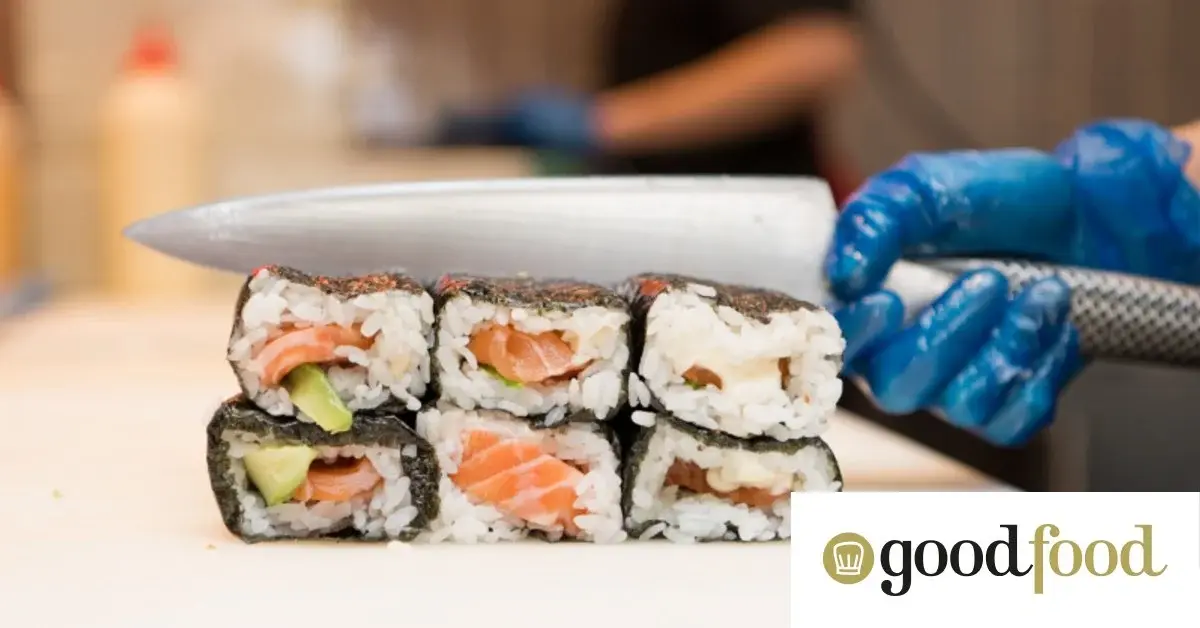
If Australian Sushi is cultural appropriation, I’d love to hear this person justify “New York Pizza”.
New York Pizza is famous globally and recognised as something different to Italian style Pizza. Is that also cultural appropriation?

Chicago deep dish is another whole crazy thing too.

wtf is new york pizza

It’s what 90% of people picture when they think of pizza.

In the US maybe, not in the rest of the world.
They picture Italian pizza.

If you ever eat sushi with salmon, that’s a Norwegian “invention” that was made to sell more fish Japan. No country “owns” a dish.

TIL Australian Sushi is a thing! It never occurred to me that they don’t have the easy to hold rolls in other parts of the world. I think they make up like 10% of my diet haha.

TIL too… I’m still not sure I understand what non Australian sushi is though. I just figured ‘authentic’ sushi would be what we have but with higher quality ingredients or potentially cut into slices to be easier to eat with chopsticks

Absolutely gorgeous article.
I had no idea our sushi rolls and banh mi were so divergent. How long until “Australian Banh Mi” is a thing overseas?

The wonderful thing about food is that it’s always changing. People shit on stuff for not being “authentic” but frankly I think it’s delightful how different traditions come together to play. Mixing and matching until the local food reflects the available ingredients and preferences of the populous.
I mean I make a mean lemon tofu which is a derivative of lemon chicken which is a derivative of a Cantonese style that was adapted for churning out cheap and appealing food so migrants could work at takeaway stores and get visas.
Food tells a story, wherever you have it and however you have it. Appreciating that is imho the more joyful approach than trying to fix it in time.

Historically, ‘authentic’ food was probably half rotten anyway.

Cultural appropriation is such a strange issue. It’s obvious to me that wearing someone’s culture as a costume is fucked up… And it’s pretty obvious too I think that opening a restaurant selling food from overseas is almost always cultural exchange… I don’t really think you can open a restaurant without a solid understanding of the food you’re making (quite unlike putting on a headdress and getting hammered on Halloween)… Somewhere in between there’s a line, perhaps, but I have absolutely no idea where it is. White people with dreads is in there somewhere, no one seems to agree on it, personally I think it’s pretty far removed from its origins and is basically a white hippy thing in it’s own right, regardless of how it began, but I know a lot of people disagree.

It’s obvious to me that wearing someone’s culture as a costume is fucked up
Why is it fucked up?

It’s a complex and multi-layered topic, as I alluded to in my previous comment, but I’ll do my best to answer this. I’m by no means an expert on this, and I’m a white English dude so far from qualified really… But I have read a lot on the topic in addition to my own gut reactions to these things.
So… First let me clarify that by “wearing someone else’s culture as a costume” I am really talking specifically about people in wealthy Western countries wearing the cultural clothing of (almost always) historically colonised peoples from elsewhere. With that being said the first point to call attention to is a kind of dry economic one - the outfits you see being worn as a Halloween costumer are broadly mass produced by companies with no affiliation to the cultures they are imitating. They make huge amounts of money selling these costumes to Westerners like me, while giving nothing back to the people they’ve taken them from. This follows a long and difficult history especially in the context of colonies - historically (not at all that this doesn’t continue today) the West has plundered the world for all its worth, and this is just a relatively subtle modern example. So even before anyone puts the costume on I’m uneasy about it, personally.
The second point is specific to certain cultural garbs which are ‘closed’ within the cultures they come from. While the other reply points out that they, as a Mexican, don’t mind seeing people dressed up in Mexican costume, you would be very hard pressed to find anyone Native American who is happy seeing anyone in a mass produced war bonnet. I won’t pretend to understand the full significance of the headdress, but its well known that it is not something you just ‘put on’ if you are a Native American, and divorcing it from that cultural context both cheapens it and shows a general lack of respect towards the people whose clothing you’re wearing.
I think that lack of respect is really the main part of my problem with costume-ising culturally significant clothing. Obviously there are clothes from all over the world which are just clothes, and quite likely the people who make those clothes would be delighted to see them being worn all over the world! But if you don’t give enough of a shit to a) learn about the culture they come from and what the significance is and b) buy them from the actual people who created them, then you lose that connection and it ceases to be cultural exchange and becomes instead appropriation.

you would be very hard pressed to find anyone Native American who is happy seeing anyone in a mass produced war bonnet.
I’d argue this is the exception, especially due to the history specific to the location where this kind of costume is common. Admittedly I come from a mixed East Asian background so my bias is based on people calling out appropriation for ao dais and kimonos and the like.
To me it seems like you’re misattributing your reaction to those wearing the costume. I disagree that a person wearing a costume has the onus to research its history. That should be on the producer/retailer.
I also disagree that a consumer should buy from the source. It’s a lot of effort and responsibility you’re placing on someone that likely has no intent for offense, when it’s simply easier and more reasonable to understand the context of the wearer and realise it’s not really an issue.

Because without living the culture, you will not get the nuance no matter how much you try.
Cultures are complex.

I’ve heard people claim cultural appropriation over this or that, but I’m not convinced it’s a real thing, and not just people being offended on behalf of someone else.
That’s not to say that cultures don’t get appropriated, but is that a bad thing? White people rocking dreadlocks, cool. Black people sporting a kimono, nice. Asian people with Klan robes, what.
We live in a culturally interconnected global community now, no group has ownership over aesthetics.

Cultural Appropriation is real, but it usually refers to entire nations or massive artists or corporations adopting a caricature of smaller cultures, to the extent that people start associating it with that nation or artist rather than the culture. An example here is Picasso using African imagery, or pop stars copying underground music genres and effectively killing them off.
The problem is that people use it to talk about regular people starting a Sushi restaurant or whatever. They do not have the power to do this sort of thing.

Fair enough. It reminds me of the whole conversation about critical race theory. It isn’t what most people think it is, and is reserved for discussions regarding much more nuanced understandings.
I still think it’s hard to distinguish whether something is, or isn’t cultural appropriation. Where is the line between inspiration and a knock-off?

Where is the line between inspiration and a knock-off?
So firstly, just like critical race theory, cultural appropriation is meant to be analysis. Fixing it doesn’t just mean “OK guys don’t do a cultural appropriation”, it’s meant to explain why cultures can lose their identity, and how they struggle.
A big part of the analysis is the power differential. One of the problems is that the culture is more associated with the trope than the real culture. It’s a very large and powerful community (or individual) taking art from a small community. It’s Taylor Swift using a drawing to promote her songs, not paying for it, and asking the artist to be glad she gave her the attention. It’s Britney Spears (IIRC) making a pop song using ideas from an online subgenre and not crediting it, causing the subgenre to implode.

deleted

Sounds delightful! Sounds like we need some Australian Sushi in my neck of the woods!

What a crock ;)

